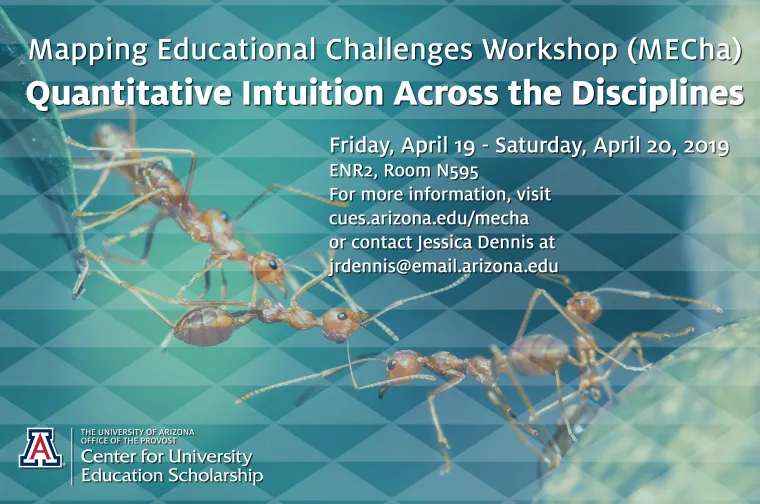When
CUES Mapping Educational Challenges (MECha) workshops explore challenges in university education by bringing together cross-disciplinary experts on the workshop theme.

About the Quantitative Intuition MECha Workshop
This two-day workshop will expand the scholarship of quantitative intuition. Leveraging expertise and interest from UA instructors from diverse disciplines, we will explore and envision frameworks and curricula that deepen our understanding of quantitative intuition and engage students more successfully in discipline-specific quantitative reasoning. Topics include, but are not limited to:
- Interplay of emotions and numbers: making data human
- Tension between (1) simplicity and realism, (2) examples and abstraction
- Role and impact of symbols
- Graphs and tables that “speak”
- Telling stories with meaning: whole numbers, decimals, rounding, and percentages
- Relating measurements to everyday objects
Organizing Committee
Deb Hughes Hallett (chair): Professor, Mathematics, UA Science; Adjunct Professor of Public Policy, Harvard Kennedy School
Chris Griffin: Visiting Professor and Research Scholar, UA Law
Hoshin Gupta: Regents Professor, Hydrology/Atmospheric Sciences, UA Science
Bonnie LaFleur: Research Professor, Epidemiology and Biostatistics, UA Public Health

Workshop Results
MECha_QI_Workshop_FullReport_FINAL.pdf
Workshop Reading Materials
Elrod, S. Quantitative Reasoning: The next 'Across the Curriculum’ Movement. Peer Review, vol. 16, no. 3, 2014, pp. 4–8. LINK
Hemenway, D. The Myth of Millions of Annual Self-Defense Gun Uses: A Case Study of Survey Overestimates of Rare Events. CHANCE 10, no. 3 (1997): 6-10. LINK
Hoffrage, Ulrich, et al. Communicating Statistical Information. Science, vol. 290, no. 5500, 2000, pp. 2261–2262. LINK
Workshop Agenda
Friday, April 19
8:30-9:00 Registration and breakfast
9:00-9:30 Introductions and the charge: rationale for the workshop
9:30-10:30 Small group discussion: framing the issue | What is quantitative intuition? Why are we concerned about it?
10:30-11:00 Coffee break
11:00-12:00 Whole group discussion: framing the issue | Weave ideas together and summarize: What is QI? How do we characterize it? Why is important to university education?
12:00-1:00 Lunch
1:00-1:30 Examples and lessons learned
1:30-2:30 Small group discussion: characterizing successes and challenges | What sparks QI? What dampens it?
2:30-3:00 Coffee break
3:00-4:00 Whole group discussion: characterizing successes and challenges | Weave ideas together and summarize: Guidelines for improving QI
Saturday, April 20
9:00-9:30 Breakfast
9:30-10:00 Examples and lessons learned |
10:30-11:30 Small group discussion: models for change | What has already been done? What could further be done to increase QI?
11:30-12:30 Lunch
12:30-1:30 Whole group discussion: models for change | Weave ideas together and summarize: What could be done to increase QI?
1:30-2:00 Coffee break
2:00-3:00 Small group discussion: shaping recommendations
3:00-4:00 Whole group discussion: shaping recommendations, and next steps

